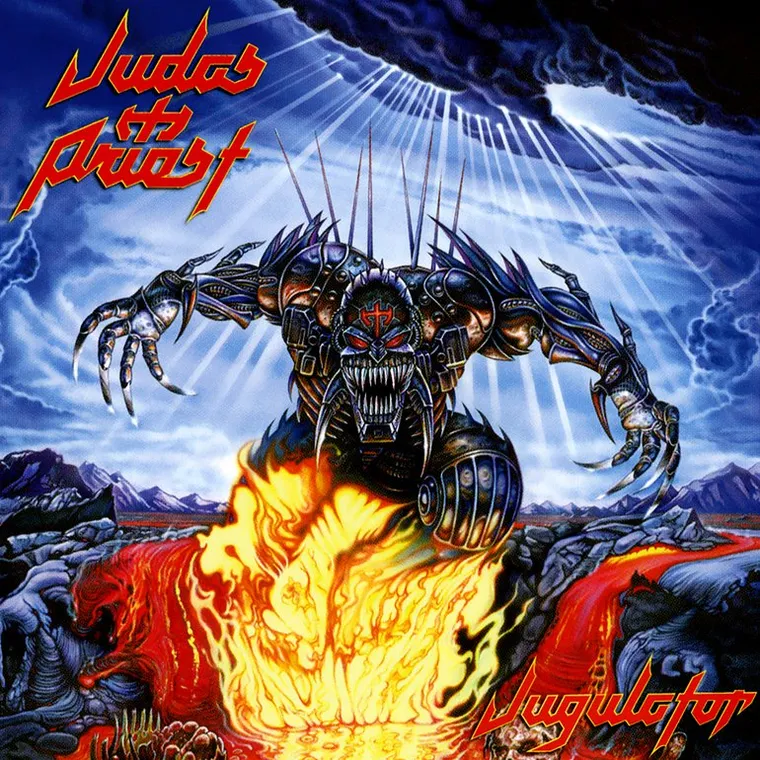Released on October 16, 1997, Judas Priest’s Jugulator didn’t just mark a new chapter for the band — it set the old book on fire. It’s not a rebirth. It’s a rebuke. A war cry soaked in rust, blood, and bile.
At a time when metal was shifting — either getting slick and radio-friendly or doubling down on sheer brutality — Judas Priest didn’t try to reclaim the past. They didn’t try to win old fans back. They came out swinging, grinding, and howling into a new era with something ugly, cold, and honestly... pretty damn misunderstood.
This wasn’t Priest picking up where Painkiller left off.
This was Priest clawing their way out of a grave they never agreed to lie in.
Between Legends and Letdowns: The Ripper Era Begins
Let’s be honest — nobody knew what to expect in '97. Halford was gone. The band had been quiet for years. And then suddenly, out of the shadows, came Jugulator. And at the front of it all? A guy from a tribute band — Tim “Ripper” Owens — with a voice like a buzzsaw and boots heavy enough to stomp a stage into splinters.
He wasn’t Halford. That was obvious. But he didn’t need to be. Jugulator didn’t want a replacement. It wanted a weapon. And Ripper was exactly that: sharp, brutal, and loud as hell.
The band leaned into it. Tipton took the reins creatively, and you can feel it — the tone is darker, the riffs thicker, the vibe way more bleak. Gone are the twin-guitar harmonies and arena-ready hooks. In their place: groove riffs, mechanical stomp, and lyrics that sound like they were pulled from a burned-out machine god’s manifesto.
This isn’t about Judas Priest evolving.
It’s about Judas Priest surviving — and not giving a damn if anyone liked how they did it.
Blood, Steel, and Teeth: Inside the Sound of Jugulator
Let’s talk about that first track. The title song. “Jugulator.” It doesn’t open the door — it kicks it off the hinges. Guitars tuned down to hell, drums pounding like warhammers, and Ripper shrieking like a tortured engine. It’s heavy, but not in a retro way. It’s metallic. Like a machine designed to crush anything nostalgic.
“Blood Stained” slows it down and gets nastier. Mid-tempo, groove-heavy, filthy as hell. It doesn’t care about speed. It cares about weight. You can feel every riff hit like a shovel to the chest.
And then there’s “Dead Meat.” Jesus. It’s like someone gave Slayer’s “Dead Skin Mask” a flamethrower and told it to go darker. It’s twisted, gory, and completely unafraid of being over-the-top. Not every line hits, but the sheer commitment makes it work.
“Bullet Train” brings back the pace — fast, sharp, with solos that rip, and Ripper absolutely howling. It’s the closest thing here to classic Priest — not because it sounds old-school, but because it’s focused, angry, and laser-precise.
And then there’s “Cathedral Spires.” The closer. The weird one. The great one. Slow, moody, and full of dread. It’s like doom metal snuck into a Judas Priest record and no one kicked it out. Ripper actually gets to sing here, and the emotion he brings hits hard. It’s not uplifting. It’s the sound of a cathedral collapsing under its own weight.
What Is This, Really?
Jugulator isn’t easy to love. It’s not catchy. It’s not charming. It doesn’t ask you to sing along — it asks you to endure. But that’s kind of the point.
This is Judas Priest in exile. Kicked out of their own kingdom. And instead of begging to be let back in, they built a new one from scrap and fire. The riffs are heavier. The drums are tighter. The whole thing is soaked in late-’90s anxiety and post-industrial grime.
Tipton’s influence is everywhere. He pushes the songwriting into harsher territory — less melody, more tension. The solos are still killer, but they show up like razor blades, not fireworks.
And Ripper? Say what you want, but he showed up. He wasn’t trying to copy Halford. He was trying to survive in a band that was both iconic and volatile. He brought power, range, and an edge that worked — especially in a record this unforgiving.
Production: Sterile, But Strong
This record sounds like it was recorded in a bunker. It’s clean, cold, and heavy — maybe too heavy. The guitars are huge but sometimes blur into sludge. The drums are tight but feel a little too locked-in. The whole thing feels designed to punch through walls, not to breathe.
And you know what? It fits. It’s not supposed to be lush. It’s supposed to sound like metal being forged in a burning scrapyard.
Final Verdict:9/ 10
Jugulator is a weird record. A hard record. A divisive record. And, if we’re being honest, a bold one. This isn’t Judas Priest trying to relive the glory days. It’s them trying to survive a decade that had moved on without them — and doing it by getting nastier, heavier, and far more brutal than anyone expected.
It’s not for everyone. If you want stadium singalongs and fist-pumping choruses, go back to Screaming for Vengeance. But if you want to hear what it sounds like when a band chooses fight over fade, this is it.
It's metal reimagined with broken teeth and a scorched throat.
And love it or not — you’ll remember it.

